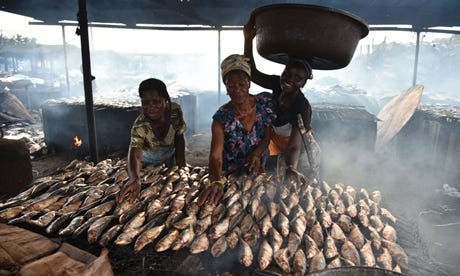Every evening along a hilly suburb in Abuja, motorists slow down beside rows of buckets to buy live catfish on their way home.
On the city’s outskirts, this roadside trade has become a lifeline for women like Bolanle, who has been in the business for five years. On good days, she sells out before nightfall. But when rain keeps customers away, some of her fish die in the drums. “I lose money. That’s the hardest part — waste,” she says.
Bolanle’s struggle reflects the paradox of Nigeria’s booming catfish industry. Fish already accounts for 40% of animal protein consumed nationwide, and Nigeria produces over one million tonnes of catfish annually — the largest output in Africa.
Yet demand far outstrips supply, and the lack of storage and processing facilities means traders like Bolanle remain trapped in a cycle of loss.
Processing hubs as lifelines
In response, an increasing number of women are citing processing hubs in parts of the state to allow them to preserve their stock through oven-drying. Unlike its fresh variant, oven-dried catfish can last for weeks.
The model is gaining traction. The BATN Foundation, for example, partnered with the Lagos State Agricultural Development Authority (LSADA) to provide 20 smoking kilns and train over 200 smallholder farmers to reduce post-harvest losses.
In Ogun State, government-supported cooperatives have distributed modern smoking kilns across its three senatorial districts, reaching more than 1,000 beneficiaries.
In Anambra, a partnership with Solidaridad West Africa has trained 170 fish farmers in aquaculture and supplied kilns and water-testing kits.
Processing hubs are not only reducing waste but also generating jobs. A survey in Ekiti State found that most processors are women aged 30–40, many of them married with children. For them, fish processing is more than business — it is sustenance for their families.
Hurdles facing catfish processing
For all their promise, these processing hubs contend with myriad challenges. Erratic power supply forces processors to rely on petrol generators or firewood, raising costs and health risks.
Food safety certification required to access premium markets is prohibitively expensive. Quality packaging materials are scarce, while rainy season humidity encourages mould and pests.
Back in Mpape, Bolanle says such hubs feel out of reach. “We just sell fresh,” she explains, adjusting her headscarf as she empties water into her drums. “I don’t know how to smoke or package. I wish there was training or a way to join others who do it, so I don’t waste so much.”
Unlocking potential
Women like Bolanle represent the most vulnerable link in Nigeria’s catfish value chain. Without access to processing, their earnings depend on the whims of weather and daily customer traffic.
But with support — from training to credit facilities and access to clean-energy kilns — they could move from mere survival to thriving small businesses.
The potential is enormous. Nigeria’s catfish industry already sustains nearly a million jobs, directly and indirectly. With greater investment, it could generate even more employment, particularly for women.
Export markets are also ripe: smoked catfish is in high demand among the Nigerian diaspora in Europe and North America. Meeting international standards could transform a roadside hustle into a foreign exchange earner.
For this transformation to happen, policymakers and investors must close the gaps: provide affordable credit, ensure localized food safety certification, and build strong cooperatives that give women entrepreneurs bargaining power and access to new markets.
As the sun sets in Mpape, Bolanle finally sells her last two live fish to a taxi driver. She wipes the sweat from her brow and counts her earnings, relieved that none of today’s stock was wasted — though tomorrow may tell a different story.
“If I could have processed them even small, maybe I won’t fear waste,” she says.
Summary not available at this time.






